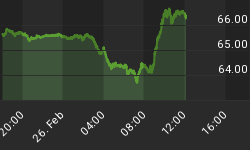Economist Gary Shilling spoke about the outlook for the U.S. economy and Treasuries with Bloomberg Television's Erik Schatzker and Deirdre Bolton this morning. In August, Schilling correctly called the drop to below 3% on the 30-year Treasury yield. Today, he told Bloomberg TV that the S&P is going to 800 and by next year the economy will be in recession and deflation.
Schilling also said the 30-year yield will drop to 2.5%.
Schilling on how much further the 30-year Treasury bond yield could fall:
"I think [the 3-year Treasury bond yield] might go back to 2.5%. That's where it was at the end of 2008 in the aftermath of the Lehman Brothers meltdown. That's my target for now. I think we are looking at deflation. As I said back then, I think that will be the media chatter by the end of the year. Plus, the weakening economy here and abroad. The long bond, the 30-year Treasury, is the ultimate safe haven in the world."
On why Schilling sees deflation on the horizon:
"In my new book, I identify seven different types of deflation. Now five of those are already in place -- we're having financial asset deflation, tangible asset deflation, commodities are coming down, wages are coming down. The one that hasn't kicked in yet is goods and services deflation. The point is that the whole world is really marking down assets. It's marking down the whole spectrum. I don't think goods and services are going to hold up in terms of inflation. I think that will move to deflation fairly soon."
On whether the Fed will decide to try to accelerate inflation:
"In effect, [the Fed] tried to do that with QE2. Because you remember at the time they were worried about deflation... That was one of the objectives. Of course, they spurred commodities, they spurred stocks and they got a temporary offset. But I think the forces of deleveraging in the world are greater than the Fed can handle. We're marking things down to equilibrium. Look at government sovereign debts around the world. They're much greater than taxpayers can handle. You either have to mark them down or get somebody else to handle them, like the Germans, or try to inflate them away. Inflating away is an excess supply world is almost impossible, even for the Fed."
On volatility in the bond market:
"In the portfolios I manage, we've maintained our 30-year bond positions. We haven't really changed them. We've changed them a little bit over time. When they got to 2.5% at the end of 2008, I said, we've gotten every pullback....It is awfully tricky to do this on a daily basis. At this point, I don't see anything that has fundamentally changed either in stocks or bonds. You have this volatility, this event-driven market. It's great for the latest news. Is Greece like to pass a law to tax itself or not? Markets jump up and down 100 points on the Dow. That is ridiculous. That is whipsaw. It shows a lot of day trading. It shows a lot of program trading. It doesn't show a lot of investing."
On other places to see a safe haven outside the Treasury market:
"There are some [safe havens] in the real estate area. We like medical office buildings. That's because of aging populations, the new medical health care bill, and improving technology. Also, 55% of physicians work for hospitals. Private practices with a storefront are disappearing. They're moving into campuses... Another one is rental apartments. People are deciding a house is no longer a sure shot investment. Prices can and do fall. They have, for the first time since the 30's...Rental apartments will continue to be very attractive."
On metals like gold, silver and copper:
"I'm agnostic on the precious metals. We have in our portfolios been short copper. Copper peaked out in February and it's down about 25% from its peak. I think it will go a lot lower. As you pointed out, copper goes into almost anything manufactured. It's a great indicator of global industrial production. What I think will really knock the pinnings out from under all commodities is a hard landing in China, which is what we're forecasting."
"[The Chinese] are trying to cool off a red-hot economy. They're worried about the property bubble and the high inflation rate. They are affecting a soft landing and with their crude economic tools it's tough. Bear in mind, the Fed, with more sophisticated tools, tried, by my reckoning, 12 times in the post World War II era to cool off the economy without precipitating a recession. They only succeeded once. What are the chances for China?"
On whether the stock market will go down:
"I think it probably is [headed back down] because the economy here is slowing, and it's global and of course a lot of the S&P 500 companies have their earnings predominantly overseas. In that kind of environment, we're going to see disappointing earnings. The Wall Street analysts always optimistic, of course, crank down their numbers....If you put a ten multiple on it, we'd be at S&P 800."
"We had a big sell-off but I really suspect that this is a pause before things drop further."
















